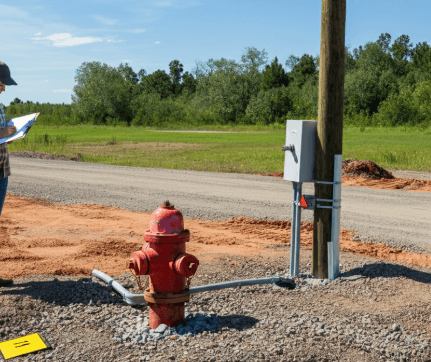When assessing access to utilities and infrastructure on land, it’s vital to understand its potential impact on your investment. According to recent data, U.S. utilities spent $50.9 billion on distribution infrastructure in 2023, highlighting the growing demand to modernize essential systems like electricity and water. This makes evaluating these factors critical for successful land development. Reliable utility access not only affects construction costs but also boosts your property’s market value and usability. Steve Daria and Joleigh, renowned real estate investors and experienced land buyers for cash, emphasize the importance of conducting thorough evaluations before committing to a purchase. Their expertise helps you avoid costly surprises and ensures you make wiser investment decisions. If you’re exploring land opportunities, start by assessing access to utilities and infrastructure on land with the right guidance. Book a free discussion with Steve and Joleigh today to uncover the hidden potential of your next investment!
Key Points
- Examine Electricity Availability and Costs: Assess if the land is connected to the main electricity grid or if alternative sources like solar power are needed. Additionally, check the costs of establishing or upgrading connections to meet development needs.
- Evaluate Water Supply Systems: Determine if the land has access to a reliable water source, such as a municipal supply or private well. This is crucial for residential, commercial, or agricultural developments, and any issues with water availability could significantly increase costs.
- Assess Sewer and Waste Systems: Look into the availability of functional sewage systems or septic tanks since waste management is a critical infrastructure component. Without existing systems, you may face high expenses for installation and compliance with regulations.
- Check Internet and Communication Infrastructure: Reliable internet and telecommunications access are essential for modern developments. Ensure the property is equipped with these utilities, as poor connectivity can affect both daily operations and long-term property value.
- Consider Road Access and Transportation Links: Infrastructure like paved roads and proximity to transportation routes influence accessibility and market appeal. Poor road connections can hinder development timelines and make the land less attractive to buyers or tenants.
What does “assessing access to utilities and infrastructure on land” mean?
Assessing access to utilities and infrastructure on land means evaluating the availability and condition of essential services that support the usability and development of a property.
These services include electricity, water, sewage systems, internet, and roads, all of which are key to ensuring the land can meet residential, commercial, or agricultural needs.
It involves confirming whether the land is connected to public utilities or if additional installations, such as power lines or water wells, will be necessary.

By analyzing these factors, you can identify potential costs, challenges, or delays that might arise during development.
For example, land without proper road access may require significant expenses to build one.
Similarly, a lack of clean water supply or wastewater systems could restrict the kinds of projects you can pursue.
Understanding these details ensures you’re making an informed decision and aligns your investment goals with the land’s capabilities.
Overall, assessing access to utilities and infrastructure on the land is a critical step before purchasing or developing property.
Get Started: Get Your Cash Offer Below…
We are direct land buyers. There are no commissions or fees and no obligation whatsoever. Start below by sharing where your property is and where we can send your offer…
What are the key utilities to check when considering a land purchase?
When considering a land purchase, it’s important to check several key utilities to ensure the property meets your needs.
Start with electricity, as having access to the power grid or alternative energy sources is crucial for most developments.
Next, evaluate the water supply to determine if the land is connected to a municipal system, relies on a shared supply, or requires a private well.
Waste management is another essential utility, so confirm whether the property is linked to a sewer system or if a septic tank is needed.
Additionally, check for reliable internet and communication services, especially if you plan on using the land for residential or commercial purposes.
Road access is also vital, as it ensures ease of transportation for everyday use or future construction activities.
Without these fundamental utilities, you may face costly upgrades or limitations on land use.
Carefully assessing access to utilities and infrastructure on the land helps you make informed decisions and avoid unexpected challenges.
What steps do I take to check water supply options for undeveloped land?
- Research the Local Water Sources: Start by identifying any natural water sources near the land, such as rivers, lakes, or underground wells. Check if these sources are accessible, reliable, and permitted for use in your area.
- Contact Local Authorities: Contact local water departments or municipal offices to confirm if the land is connected to a public water supply. If applicable, they can provide information on water availability, quality, and connection fees.
- Inspect Existing Infrastructure: Visit the site and check for signs of existing water infrastructure, such as pipes, meters, or wells. If you find a well, have it tested by a professional to ensure it produces clean and adequate water.
- Consult a Water Surveyor: Hire a water surveyor to evaluate the land’s potential for a private water source, like a borewell. They can perform tests to confirm if the groundwater level is sufficient for your needs.
- Review Legal and Environmental Regulations: Investigate local laws and environmental guidelines to confirm whether the land allows for private wells or water systems. Some areas may have restrictions to protect water reserves, so it’s vital to understand these before proceeding.

Are there tools or professionals to help evaluate land infrastructure?
There are several tools and professionals available to help evaluate land infrastructure effectively.
Land surveyors are experts who can assess property boundaries, elevation, and overall land usability.
Civil engineers can be hired to review the land’s potential for development and provide insights on infrastructure like roads, drainage, and utilities.
Additionally, environmental consultants can evaluate the environmental impact and check for compliance with local regulations.
Online mapping tools and satellite imagery are useful for exploring access to nearby utilities and understanding topography.
Local government offices and utility providers can also supply valuable data, such as maps of water lines, power grids, or sewer connections.
Geotechnical engineers can test soil stability if the land is undeveloped to ensure it can support construction.
Using these resources and experts makes assessing access to utilities and infrastructure on land a much clearer and more informed process.
They help identify challenges early and reduce risks associated with your purchase or development plan.
What are the potential costs of connecting utilities to a property?
- Electricity Connection: Tying a property to the power grid often involves installation fees, poles, and running electrical lines. Depending on the distance from the closest utility point, this can cost anywhere from $1,500 to $5,000 or more if extra equipment like transformers is required.
- Water Connection: If you’re connecting to a city water system, you’ll need to budget for permits, piping, and trenching. Costs typically fall between $1,000 and $5,000. If you’re drilling a well instead, prices vary from $3,500 to $15,000 based on the depth and system required.
- Sewer or Septic Installation: Hooking up to a municipal sewer system includes connection fees, possible line extensions, and permits, usually costing $3,000 to $10,000. As an alternative, a septic system ranges from $3,000 to $10,000, depending on the property’s needs.
- Internet and Cable Services: Setting up internet or cable services can require running wires or poles to your location. These installation costs range from $100 to $1,500, but they may increase if you’re far from existing infrastructure or need satellite options.
- Gas or Alternative Energy Sources: Connecting to natural gas may cost between $500 and $2,000, with expenses covering permits and pipelines. However, if natural gas isn’t an option, installing alternatives like propane tanks or solar systems can range widely from $5,000 to $30,000, depending on your energy needs.
How do I start assessing access to utilities and infrastructure on land before making an offer?
To start assessing access to utilities and infrastructure on land before making an offer, begin by researching the property’s proximity to essential services like water, electricity, gas, and sewer systems.
Check with local utility providers or government offices to confirm the availability of these services and any associated connection fees.
Next, visit the land in person to look for visible signs of existing infrastructure, such as power lines, water meters, or road access.
If utilities are not readily accessible, consider the costs and feasibility of bringing them to the property, as this can impact its overall value and usability.
Consulting experts like Steve Daria and Joleigh, seasoned real estate investors and land buyers for cash, can provide valuable insight and advice during this process.
To ensure you’re making the right move, don’t hesitate to consult professionals and gather as much information as possible.
Contact Steve Daria and Joleigh today to guide you through the process and help you make confident, well-informed buying decisions.
**NOTICE: Please note that the content presented in this post is intended solely for informational and educational purposes. It should not be construed as legal or financial advice or relied upon as a replacement for consultation with a qualified attorney or CPA. For specific guidance on legal or financial matters, readers are encouraged to seek professional assistance from an attorney, CPA, or other appropriate professional regarding the subject matter.
